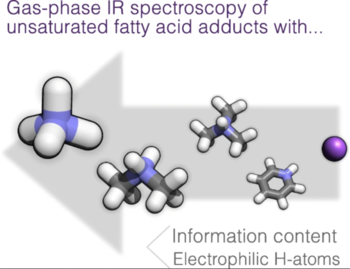Non-Covalent Double Bond Sensors for Gas-Phase Infrared Spectroscopy of Unsaturated Fatty Acids
Kirschbaum, C.; Greis, K.; Lettow, M.; Gewinner, S.; Schöllkopf, W.; Meijer, G.; von Helden, G.; Pagel, K.* – 2021
The position and configuration of carbon-carbon double bonds in unsaturated fatty acids is crucial for their biological functions and influences health and disease. However, double bond isomers are not routinely distinguished by classical mass spectrometry workflows. Instead, they require sophisticated analytical approaches usually based on chemical derivatization and/or instrument modification. In this work, a novel strategy to investigate fatty acid double bond isomers (18:1) without prior chemical treatment or modification of the ion source was implemented by non-covalent adduct formation in the gas phase. Fatty acid adducts with sodium, pyridinium, trimethylammonium, dimethylammonium, and ammonium cations were characterized by a combination of cryogenic gas-phase infrared spectroscopy, ion mobility-mass spectrometry, and computational modeling. The results reveal subtle differences between double bond isomers and confirm three-dimensional geometries constrained by non-covalent ion-molecule interactions. Overall, this study on fatty acid adducts in the gas phase explores new avenues for the distinction of lipid double bond isomers and paves the way for further investigations of coordinating cations to increase resolution.





